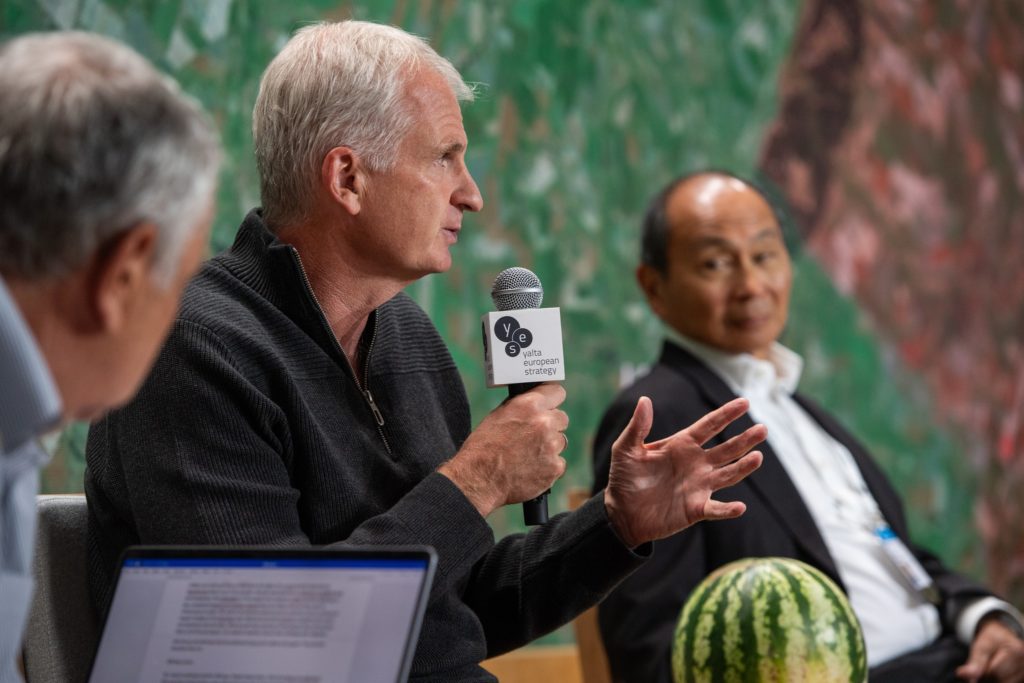At the high-profile Yalta European Strategy (YES) forum in Kyiv earlier this month, more than 500 leading politicians, diplomats, businesspeople, civil society representatives, and experts from 29 countries gathered to discuss Ukraine's future and role on the global stage.
Insights from Ukrainian military leaders
Maj. Gen. Vadym Skybytskyi, Ukraine Ministry of Defense Main Intelligence Directorate deputy director: “The Russian Federation is waging a war in which the entire state is involved. They completely put the economy on a wartime footing. The military industry is trying to increase the production of, as they call it, 'high-tech weapons.' We see that everything that is produced at their enterprises immediately goes to the army and is used in our country. Thus, in order to defeat Russia and stop missile attacks, it is necessary to neutralize the production of items that are used for military purposes... One of the very important factors is international aid, because without modern equipment, long-range weapons, and powerful ammunition, it would be very difficult to penetrate and break the Russian defense line. That's why we count on it. Our warriors and our armed forces, believe me, are experienced enough in planning and conducting [an] active offensive to achieve the strategic goal, which is the complete liberation of our territory from the aggressor.”
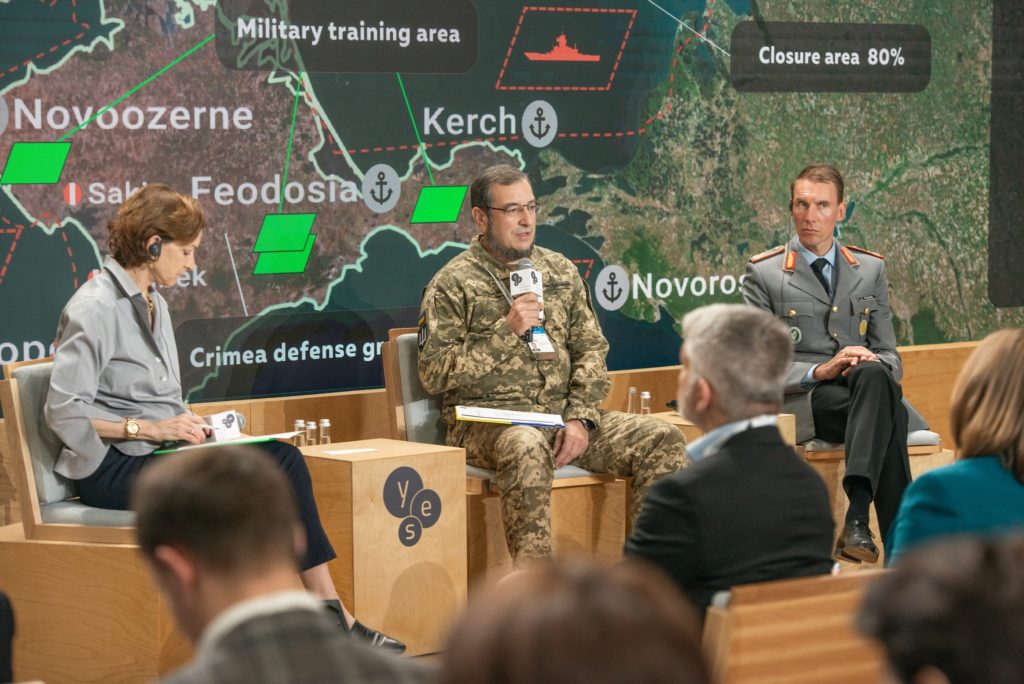
Rustem Umerov, newly appointed Minister of Defense: “Our army is one of the largest, strongest, and most motivated in the world. Because we know what we are fighting for. But we need more military equipment. We need it today, we need it tomorrow, we need it now. We are grateful for the support, but we need more heavy weapons, and again—heavy weapons.”
Kyrylo Budanov, Ministry of Defense Main Intelligence Directorate chief: “The war has not benefited the Putin regime: The economy is failing, and that's a fact. Finances rest on reserves, and military power has been severely decimated during the war. Generally speaking, the professional army ran out last autumn. Now mobilized soldiers are fighting in their army. The production of new weapons and equipment is utterly insufficient... In terms of creativity and flexibility, we still beat Russia. Putin's regime is no longer as powerful. But the enemy has not yet been defeated, and you can't just say that everything is absolutely bad for them. They are adapting. They have built more than one line of defense well. Yet our advancement goes on!”
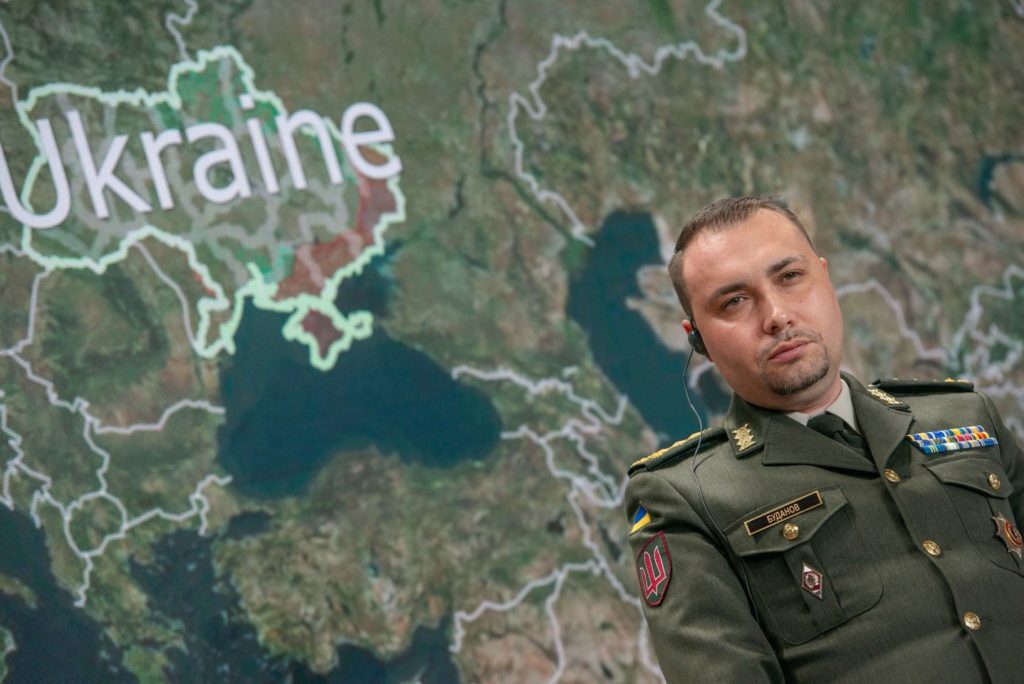
The West's role in Ukraine's struggle
Neil Ferguson, Stanford University senior fellow:
“Some people in the US will say that investment in the Ukraine war is a waste of money. But this is not the case—this war is an extraordinarily efficient war with a decent prospect of success even without the miracles that might have been good from the counter-offensive. In fact, it is the best value for money. Ensuring Ukraine's national security is the best financial investment... We cannot afford to lose this war. If, two years from now, our attention span has wavered. If the Russian offensive is being reported on, this is not just a tragedy for Ukrainians but for Europe and the whole world. The Pacific region is also turbulent. The cost of a hypothetical reconquest of Taiwan is much higher than the price of supporting Ukraine. Both the United States and its allies will not be able to financially cover the costs of a new Cold War.”
Radosław Sikorski, European Parliament member and European Union-United States Delegation chair: “In my discussions with Europeans, I tell them that there is no need to try to normalize relations with Russia. It will never be democratic, it is more like an invader with a Shahid belt on. The real question is how to stop this invader...A Belgian, an Italian, or a Portuguese person perceives security or danger differently. The reason for this is the fact that no Russian soldier has ever stepped on their soil, or is ever likely to do so. This is where all these positions come from.”
Jim Costa, US congressman: “If the US and EU is all in—we will win—and we need to define win to the people in our countries. Ukraine is a long way from the US, and what is most effective with constituents I talk to is making the distinction between good and evil. The international tribunal for war crimes must happen, the children must be brought back. This is not Afghanistan or Iraq—this is the test of our time—we will be judged by historians on whether we stood up and defended a rules-based economy, human rights, freedom of expression, freedom of speech, freedom of the press, etc. This is our time—if not now, then when will we stand up for what we believe in as democratic countries? We have to provide all the necessary support to ensure victory.”
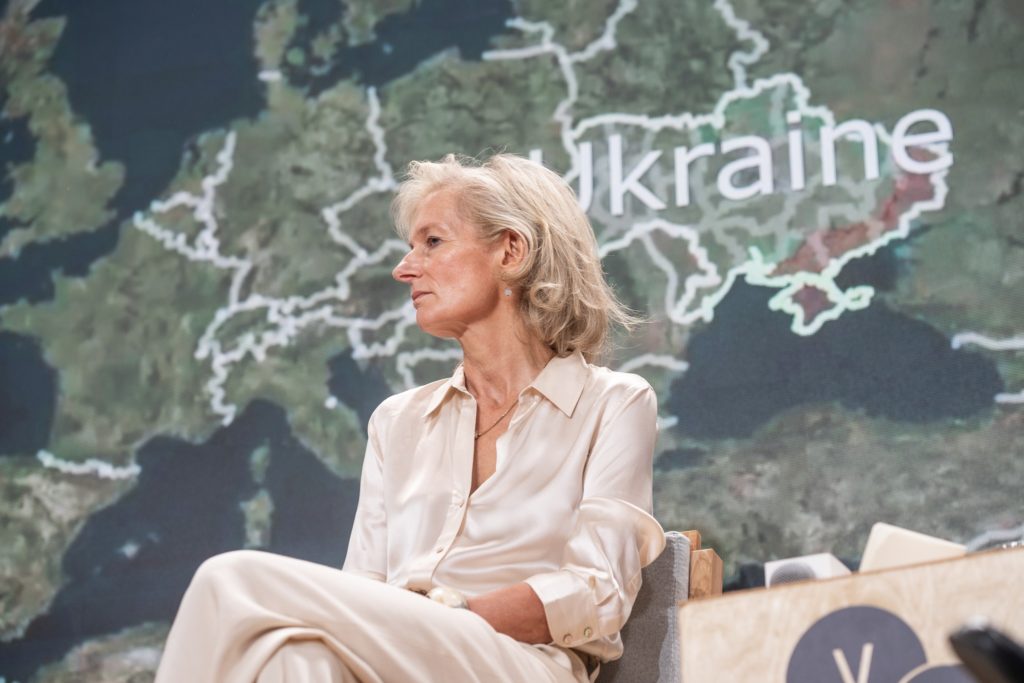
Zanny Minton Beddoes, The Economist editor in chief: “Can the West distance itself from Russia economically? I think it has been very complicated in the last two years because Russia supplies commodities around the world...I do not think that sanctions will be decisive for the Ukrainian victory. Much more important here are the courage and resilience of Ukrainians, as well as military and economic support of Ukraine.”
Kurt Volker, former special representative for Ukraine negotiations, US Department of State: “Ukraine is engaged in an existential struggle against an imperialist power. The last time this happened was during World War II, and we thought we’d won that fight then. Looking at the situation in Ukraine, the only decisive victory will be a victory over the ideology of imperialism that Russia is trying to justify.”
Reforms and Eurointegration
Yuliia Svyrydenko, first vice prime minister of Ukraine and minister of economy: “We, in the government, should focus on two things. Supporting local businesses that are taxpayers, which will allow [them] to pay wages to their employees and will facilitate us paying allowances to the military. And also insurance. The government expects Parliament to vote on amendments and changes to the legislation, which will allow Ukrainian agencies to insure both Ukrainian and foreign companies that will be involved in the rebuilding of Ukraine.”

Carl Bildt, former Swedish prime minister from 1991 to 1994 and former minister of foreign affairs from 2006 to 2014:
“This process [eurointegration] has become much faster than anyone could have predicted a few years ago. I think that Ukraine's membership will be dominating the upcoming EU-level meetings in October. Next, we will discuss prospects and opportunities, and there will be a European Council meeting in December, which will also address this.”
Boris Johnson, former British prime minister: “We need to have Ukraine in NATO as fast as possible. What works is NATO. It has proved that it works. The argument was that Putin might get provoked, but look what has happened without NATO. Only Ukraine's membership in the alliance is a long-term solution for the Russian problem... A peaceful solution with Putin cannot be achieved. I’m skeptical. But we’ve got to hope that it works... We always end up giving what is needed, but we always do it months and months too late. My question to friends from other Western countries is simply, why are we waiting? Get on with it now, and we will save lives and bring this disastrous conflict to an end.”
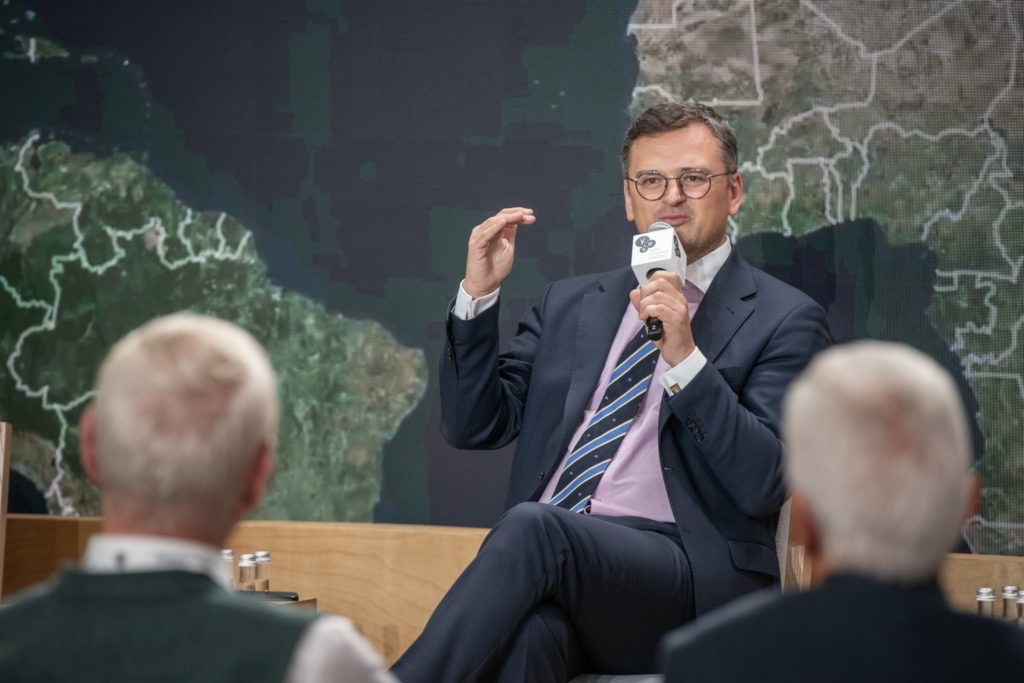
Dmytro Kuleba, minister of foreign affairs of Ukraine: “Objectively, we have a problem with current international law, which is unable to condemn President Putin, the prime minister of Russia, Minister Lavrov, and others for crimes of aggression. We must choose between lawlessness and justice. Accordingly, we must follow the path of justice and update international law...For the sake of the International Tribunal, for the sake of justice, for the sake of fighting lawlessness, ultimately for the sake of honoring the victims of war and their families, it is necessary to recognize that if the law does not meet the goals of establishing justice, then we need to change international law, as it has been done before, to make justice possible.”
Ukrainian society vs. Russian society
Serhiy Zhadan, poet, novelist, and frontman of the band Zhadan i Sobaky: “In my subjective opinion, we now have a fundamentally different sense of history and ourselves. Let’s use a metaphor to compare Ukrainian society with Russian society, then Ukrainian society is a young punk band that is going to gather stadiums. And we will definitely do this. For us, everything just has started, there is a huge reserve of strength, energy, and most importantly, there is an understanding of strategy and where to go. The Russians are a jaded, slightly elderly cabaret singer, who has lost his audience and popularity but tries to create an illusion of success and glamour...Soviet and post-Soviet paternalism survives and washes out quite intensively in our country, and in Russia, it is a certain national philosophy that governs many processes. We had a big disagreement, and it happened not nine years ago on the Maidan. It has been happening for the past 30 years. The experience of statehood is much more important for Ukrainians than for Russians.”

Timothy Snyder, Yale University historian and professor: “If we look at the motivation, language, and rhetoric of Russian propagandists and their soldiers, we will see a kind of competition in hopelessness. That is, we are done, and the only thing that matters is force... This is not a war in which the aggressor has some vision, some outline of the future. Rather, on the contrary, for them everything is black, formless, and the only thing that matters is force. Russians cannot tolerate that there may be any alternative to their vision, that people may have a different idea of what is better.”
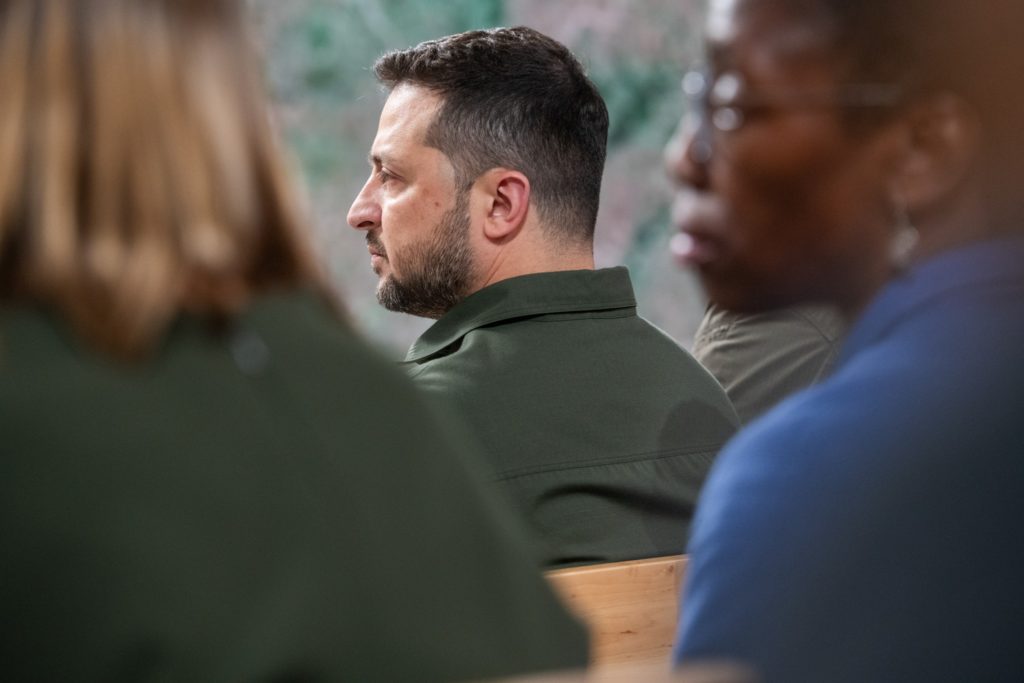
Volodymyr Zelenskyy, president of Ukraine:
“We are defending ourselves, among other things, because the vast moral space of the world has united and is helping to defend Ukraine. Ukraine and thus a reflection of our own values. And Putin is attacking not only Ukraine, but also this moral space, which is ultimately capable of bringing to justice any terrorists and murderers, any aggressors. It is capable when it is morally mobilized... Human morality must win this war. And this is not only a matter for Ukraine as a state, it is a matter for Ukraine as all of us. Everyone in the world who values freedom, who values human life, who believes that people must win. And our success, the specific success of Ukraine, depends not only on us, on Ukrainians, but also on the extent to which the entire vast moral space of the world wants to preserve itself. On the extent to which the world remains morally mobilized.”
Ukrainian soldiers' perspective
Masi Nayem, founder of Miller law firm, serviceman of the Armed Forces of Ukraine: “I definitely want revenge. I want to take revenge in the most horrible way, which is only allowed by international conventions. Why do I want this? I wanted this so I would never be ashamed of myself in front of those people Russia took from us. I want my friends who have not yet been mobilized to never be mobilized. I am fighting so that most people in this country stay alive and are able to live on...Every person wounded is wounded for the rest of their life. Anyone who has died will never say anything again. Unfortunately, there is too much pathos, romance, and beautiful stories around the war”
Denis Zayikov, assistant chief of S-2 section, 25th separate airborne brigade of Ukraine's forces: “We must achieve our goal: free Ukraine. We have to preserve our land, our families, and our children. I don't want my children and the children of everyone present here to see what my eyes and the eyes of those heroic people next to me have seen.”
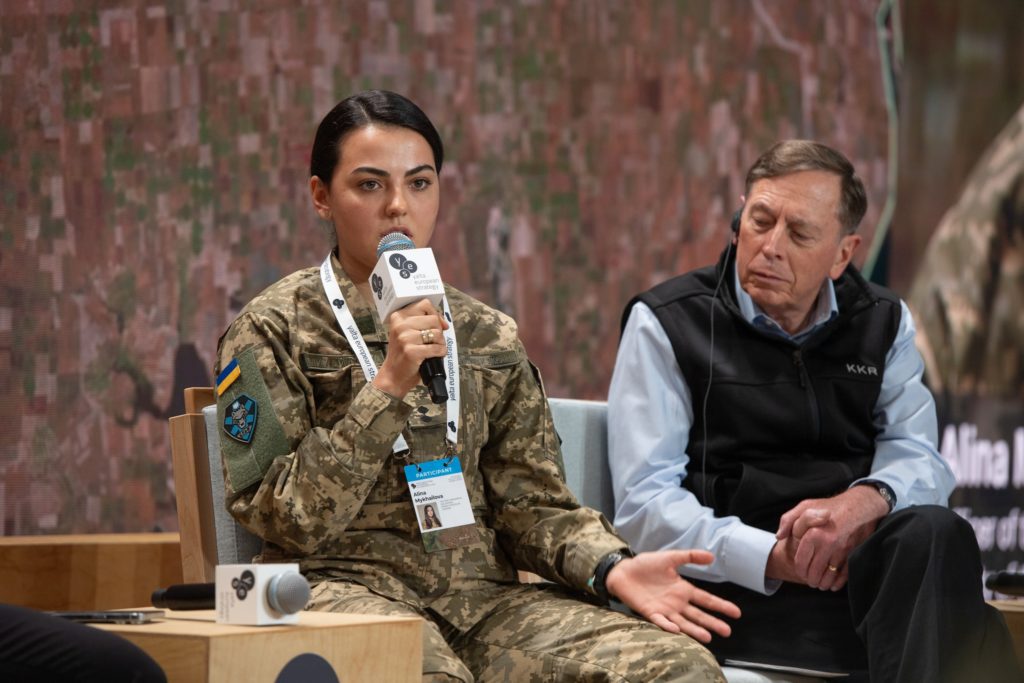
Alina Mykhailova, officer of the Armed Forces of Ukraine, member of the Kyiv City Council, and public activist: "We are suffering losses. There's nothing romantic in this. I have been at war for five years. For the first time in these years, I was ready to give everything to my unit on the Kupiansk front. For the first time in my life, I was willing to talk to anyone to give my battalion a chance to live. What is happening on the front today, you won't read about it on the internet."
Dmytro Finashin, senior sergeant of the National Guard, Hero of Ukraine: “We need to get our victory. Our best people are dying, those who should shape the future of Ukraine. That is why it is necessary to reduce our losses. The world must help us, because we are fighting for global democracy.”
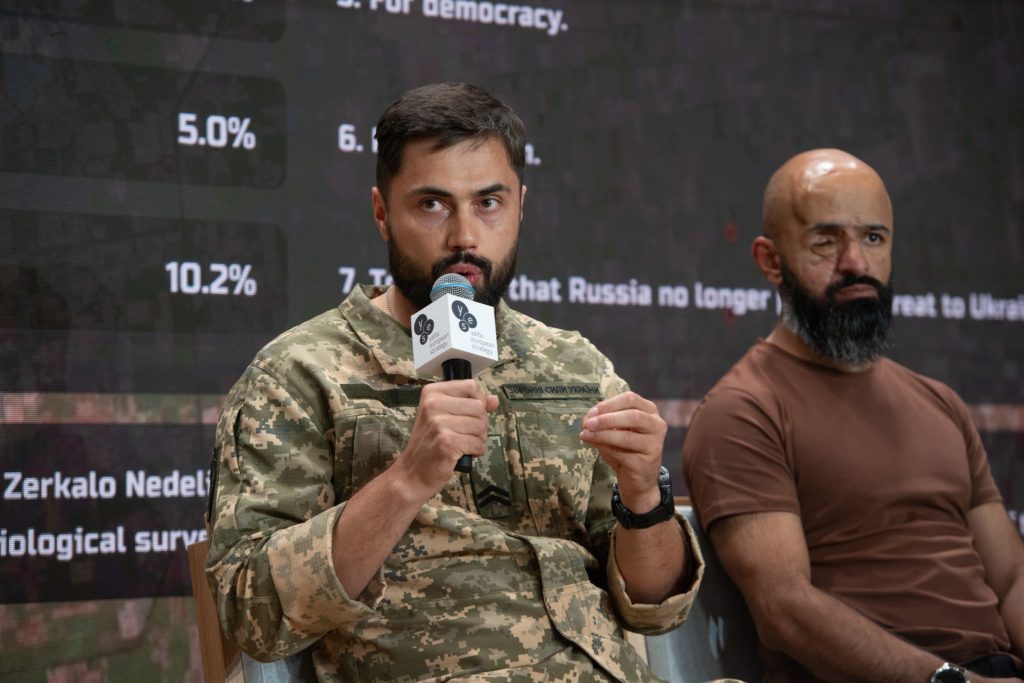
Yehor Firsov, junior sergeant, combat medic of the 109th brigade of Ukraine's forces: “We are fighting for our right to be happy. We have been unhappy for so long. Now they are destroying everything which is dear to us, our freedom. If we don't have freedom, we will never be happy.”

